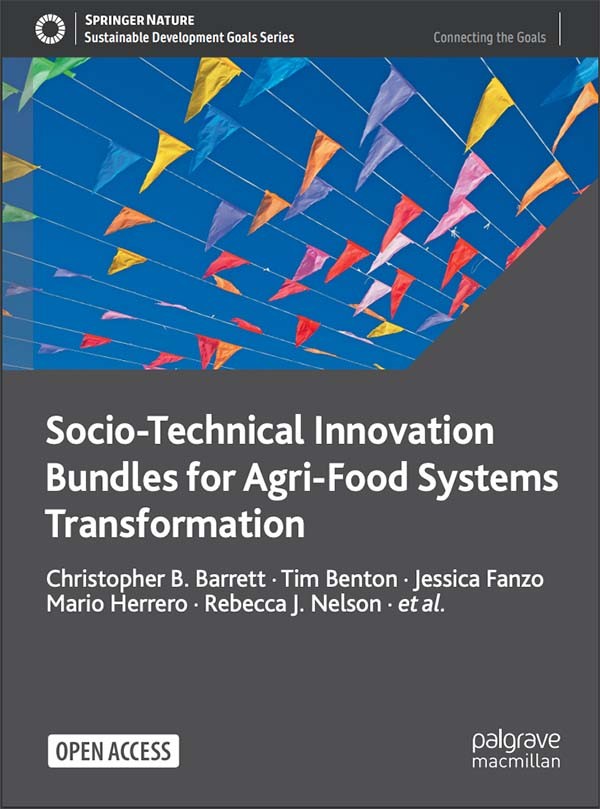Book addresses future of local and global agri-food systems
By Nicole Rossi
A new open-access book constitutes the most authoritative study on the future of local and global agri-food systems, exploring the challenges of today and envisioning potential food systems scenarios through 2070.
The book, “Socio-Technical Innovation Bundles for Agri-Food Systems Transformation,” is part of the Sustainable Development Goals Series and is published in Springer Nature’s inaugural cross-imprint book series. Lead authors include Chris Barrett, Mario Herrero and Rebecca Nelson of Cornell; Tim Benton of Chatham House and the University of Leeds; and Jessica Fanzo of Johns Hopkins University.
The book is a result of an expert panel, convened in 2019 by the Cornell Atkinson Center for Sustainability and Nature Sustainability, that engaged more than 20 business, government, nonprofit and scientific experts from around the world in dialogue around urgent challenges of food systems, sustainability and global hunger. Those findings, contained in the book, offer recommendations for policymakers that the authors said would lead to healthy and nutritious diets; equitable and inclusive value chains; resilience to shocks and stressors; and climate and environmental sustainability.
“Nearly 3 billion people today cannot afford a healthy diet, and the problem is only growing more profound,” said Barrett, the Stephen B. and Janice G. Ashley Professor in Cornell’s Dyson School of Applied Economics and Management, with joint appointments in the departments of Economics and Global Development, and in the Jeb E. Brooks School of Public Policy. “With inevitable population growth, it is impossible to continue down our current path without destroying the planet and imperiling billions more.”
“Urgent solutions are needed now to transition our highly unsustainable global food systems toward a future that can scale within planetary bounds to sustainably feed our growing population,” said Herrero, professor of sustainable food systems and global change in the Department of Global Development, in the College of Agriculture and Life Sciences, and a Cornell Atkinson Scholar. “Our current food systems are highly productive, but it comes at a cost that the planet simply cannot afford.”
Fanzo, the Bloomberg Distinguished Professor of Food Policy and Ethics at Johns Hopkins University, said the book takes a transdisciplinary approach to the problem of hunger and food systems.
“Our primary recommendations combine social and technological innovations,” Fanzo said. “There’s really no technology that’s a silver bullet, but if we bundle innovative technologies with methods to educate our food producers, they provide complimentary benefits to address the essential issues.”
Throughout the panel process, Nelson, professor in the School of Integrative Plant Science (SIPS) and Global Development, stressed that a circular economy is paramount.
“We must go from a mine or make, use and waste model to one where we are upcycling,” Nelson said. “What would it take to get people to develop value chains from organic underutilized resources such as crop residues, food scraps or agro-industrial byproducts to reduce waste and reliance on fossil fuels?”
Among the co-authors of the report, as well as companion papers in Nature Sustainability and other journals, are: Ed Buckler, adjunct professor in SIPS and a Cornell Atkinson fellow; Elizabeth Bageant, research support specialist in the Department of Public and Ecosystem Health in the College of Veterinary Medicine; and Daniel Mason D’Croz, senior research associate in the Department of Global Development (CALS).
A version of this article appears in the CALS Newsroom.
Nicole Rossi is a communications specialist with Food Systems and Global Change for the Department of Global Development in the College of Agriculture and Life Sciences.
Media Contact
Get Cornell news delivered right to your inbox.
Subscribe

